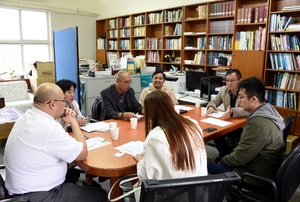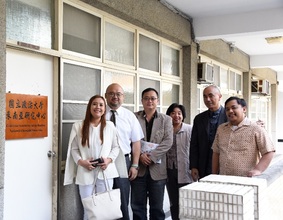Research and Experience Exchange between Ifugao State University of the Philippines and the Center for Southeast Asian Studies of National Chengchi University


Date :
2019-02-25
Department :
-
By Taiwan-Philippines science and technology innovation center
Since the end of last year, National Chengchi University(NCCU) started executing a MOST project of an innovation center. With approaches of “cultural ecology”, “regional environmental management”, and “development studies”, the project aims to compare and exchange experience of the indigenous knowledge, local knowledge and sustainable development of Taiwan and Philippines indigenous people. The innovation center plans to set up an office at Ifugao State University(IFSU) in the Philippines.
In order to discuss the collaboration and research work, the Principal of IFSU, Eva Marie Dugyon, the Dean of Student Affairs, Manuel III Malingan, the Chief of International Affairs and Exchange, Richard Baliao, and the Executive Director of GIAHS Center, Eulalie Dulnuan visited NCCU on February 19.
The first stop of the visit was the Center for Southeast Asian Studies, NCCU. The Executive Director of the center, Professor Yang Hao, introduced Five Flagship Projects of Taiwan’s New Southbound Policy— industry and business; medical and public health cooperation; education and youth exchange platforms; agricultural cooperation; and the organization of policy forum. Prof. Yang also briefly introduced their effort on promoting Southeast Asian courses in NCCU and facilitating international exchange with Taiwan-Asia Exchange Foundation.
Prof. Yang pointed out the transition of the value of Taiwan’s southbound policy. In 1990s, it emphasized on investment and economic development but in recent years, it put more emphasis on the exchange and connection with the people. Prof. Yang explained, economic growth plays an important role in development; however, the foundation of economic growth is sustainability. Prof. Yang also emphasized that our relationship with other countries aren’t a giving or aiding relationship but a relationship of mutual sharing and supporting.
During the discussion, both sides discovered the similarities between Taiwan and the Philippines. For instances, located in typhoon-prone areas, the two countries share similar experience and are both faced with natural resources and disaster management issues. Historically, they have been governed and penetrated by foreign countries and now commit themselves to the decolonization work. In addition, both universities dedicate themselves to the collaboration with local community and the exchange with international institutes. IFSU GIAHS center director, Eulalie, shared their project with local farmers on the recording of local eco-system changes and the collaboration with Kanazawa University, Japan. The President of IFSU also shared that they were planning to establish an indigenous studies center, and therefore, they were seeking more international connections.
In 2017, the Center for Southeast Asian Studies started to serve as the secretariat of the Consortium of Southeast Asian Studies in Asia and obtained the opportunity to host the 2019 SEASIA Biennial Conference. Prof. Yang invited the innovation center team to organize a panel to share their experience in the biennial conference. In the end of the discussion, both sides brainstormed an idea of a “round table” in the Biennial Conference. They hoped that “the round table” could promote the dialogue between the local organization of both countries and the exchange of their community development experience and collaboration with academic institutions.
Since the end of last year, National Chengchi University(NCCU) started executing a MOST project of an innovation center. With approaches of “cultural ecology”, “regional environmental management”, and “development studies”, the project aims to compare and exchange experience of the indigenous knowledge, local knowledge and sustainable development of Taiwan and Philippines indigenous people. The innovation center plans to set up an office at Ifugao State University(IFSU) in the Philippines.
In order to discuss the collaboration and research work, the Principal of IFSU, Eva Marie Dugyon, the Dean of Student Affairs, Manuel III Malingan, the Chief of International Affairs and Exchange, Richard Baliao, and the Executive Director of GIAHS Center, Eulalie Dulnuan visited NCCU on February 19.
The first stop of the visit was the Center for Southeast Asian Studies, NCCU. The Executive Director of the center, Professor Yang Hao, introduced Five Flagship Projects of Taiwan’s New Southbound Policy— industry and business; medical and public health cooperation; education and youth exchange platforms; agricultural cooperation; and the organization of policy forum. Prof. Yang also briefly introduced their effort on promoting Southeast Asian courses in NCCU and facilitating international exchange with Taiwan-Asia Exchange Foundation.
Prof. Yang pointed out the transition of the value of Taiwan’s southbound policy. In 1990s, it emphasized on investment and economic development but in recent years, it put more emphasis on the exchange and connection with the people. Prof. Yang explained, economic growth plays an important role in development; however, the foundation of economic growth is sustainability. Prof. Yang also emphasized that our relationship with other countries aren’t a giving or aiding relationship but a relationship of mutual sharing and supporting.
During the discussion, both sides discovered the similarities between Taiwan and the Philippines. For instances, located in typhoon-prone areas, the two countries share similar experience and are both faced with natural resources and disaster management issues. Historically, they have been governed and penetrated by foreign countries and now commit themselves to the decolonization work. In addition, both universities dedicate themselves to the collaboration with local community and the exchange with international institutes. IFSU GIAHS center director, Eulalie, shared their project with local farmers on the recording of local eco-system changes and the collaboration with Kanazawa University, Japan. The President of IFSU also shared that they were planning to establish an indigenous studies center, and therefore, they were seeking more international connections.
In 2017, the Center for Southeast Asian Studies started to serve as the secretariat of the Consortium of Southeast Asian Studies in Asia and obtained the opportunity to host the 2019 SEASIA Biennial Conference. Prof. Yang invited the innovation center team to organize a panel to share their experience in the biennial conference. In the end of the discussion, both sides brainstormed an idea of a “round table” in the Biennial Conference. They hoped that “the round table” could promote the dialogue between the local organization of both countries and the exchange of their community development experience and collaboration with academic institutions.


 Fax:886-2-29379611
Fax:886-2-29379611